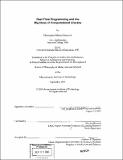Real-time programming and the big ideas of computational literacy
Author(s)
Hancock, Christopher Michael, 1961-
DownloadFull printable version (16.89Mb)
Other Contributors
Massachusetts Institute of Technology. Dept. of Architecture. Program In Media Arts and Sciences.
Advisor
Mitchel Resnick.
Terms of use
Metadata
Show full item recordAbstract
Though notoriously difficult, real-time programming offers children a rich new set of applications, and the opportunity to engage bodily knowledge and experience more centrally in intellectual enterprises. Moreover, the seemingly specialized problems of real-time programming can be seen as keys to longstanding difficulties of programming in general. I report on a critical design inquiry into the nature and potential of real-time programming by children. A cyclical process of design, prototyping and testing of computational environments has led to two design innovations: a language in which declarative and procedural descriptions of computation are given equal status, and can subsume each other to arbitrary levels of nesting [and] a "live text" environment, in which real-time display of, and intervention in, program execution are accomplished within the program text itself. Based on children's use of these tools, as well as comparative evidence from other media and domains, I argue that the coordination of discrete and continuous process should be considered a central Big Idea in programming and beyond. In addition, I offer the theoretical notion of the "steady frame" as a way to clarify the user interface requirements of real-time programming, and also to understand the role of programming in learning to construct dynamic models, theories, and representations. Implications for the role of programming in education and for the future of computational literacy are discussed.
Description
Thesis (Ph. D.)--Massachusetts Institute of Technology, School of Architecture and Planning, Program in Media Arts and Sciences, 2003. Includes bibliographical references (p. 115-121).
Date issued
2003Department
Program in Media Arts and Sciences (Massachusetts Institute of Technology)Publisher
Massachusetts Institute of Technology
Keywords
Architecture. Program In Media Arts and Sciences.